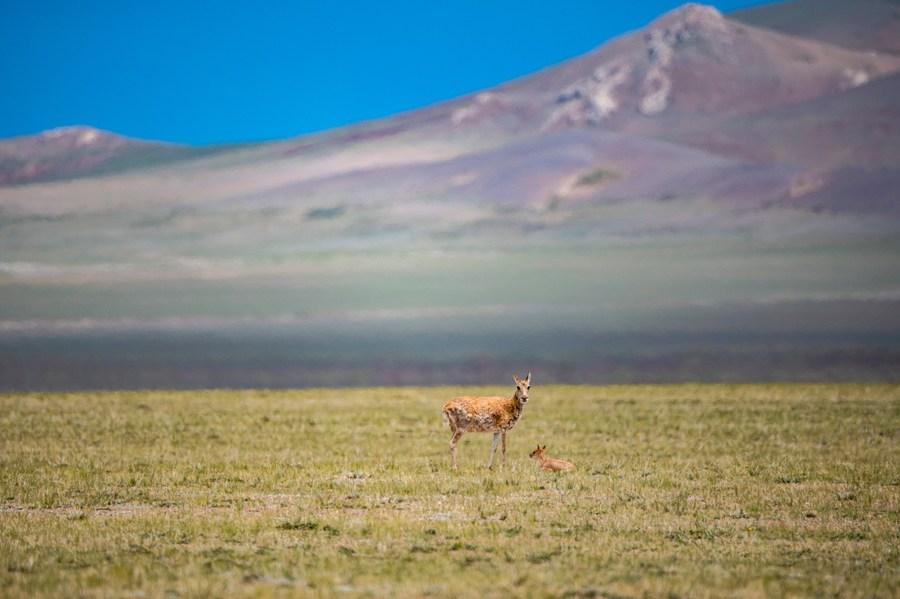Symposium lauds Xi's thought on environment

Photo taken on July 11, 2022 shows a female Tibetan antelope taking care of its baby at the Qiangtang National Nature Reserve in Southwest China's Tibet autonomous region. [Photo/Xinhua]
Development in harmony with nature a unique contribution to civilization
The concept of an ecological civilization promoted by China stresses harmony between humanity and nature and will help address prominent problems plaguing industrial civilization, experts said.
They made the remarks at an online symposium on the study and implementation of Xi Jinping Thought on Ecological Civilization, which was hosted by the Ministry of Ecology and Environment on Monday in Beijing.
The event was held in the wake of Xi stressing "harmony between humanity and nature" as a major feature of China's modernization at the 20th National Congress of the Communist Party of China.
Chinese modernization is the modernization of a huge population, of common prosperity for all, of material and cultural-ethical advancement, of harmony between humanity and nature, and of peaceful development, Xi said at the opening session of the congress, which ran from Oct 16 to 22.
"Respecting, adapting to and protecting nature is essential for building China into a modern socialist country in all respects," said Xi, who is also general secretary of the CPC Central Committee. "We must remember to maintain harmony between humanity and nature when planning our development."
Maintaining harmony between humanity and nature in pursuing modernization transcends the Western theory of modernization, according to Zhang Jianchun, vice-minister of the Publicity Department of the CPC Central Committee.
"Since the beginnings of industrial civilization, although massive material wealth has been created, serious ecological damage that is difficult to reverse has also occurred," he said. "The drawbacks of the Western mode of modernization are increasingly evident."
The vice-minister also stressed national conditions, such as a large population, comparatively limited resources and inadequate carrying capacity of the environment to support this.
China will not follow the Western mode of "pollution first, and then treatment", Zhang stressed. Instead of plundering and damaging nature, China will follow a path of development that ensures increased production, higher living standards and healthy ecosystems.
Gong Weibin, vice-president of the National Academy of Governance, said China's green path to modernization is pursuing the right direction in the development of human civilization.
Due to the high occurrence of environmental crises, Western countries have reflected on the development path in the process of modernization, he said. While strengthening environmental governance at home, they exported industry on a large scale.
While these measures have eased the strain with nature there, the irreparable conflict between rampant capital expansion and the environment remains, he said.
The large-scale export of industry has consumed vast amounts of natural resources in developing countries, resulting in moral crises, he said.
"The birth and establishment of every new mode of civilization must respond to and address conflicts and problems that cannot be solved by the previous modes," he said.
Through an in-depth reflection on the traditional Western approach to modernization, Xi Jinping Thought on Ecological Civilization has made harmony between humanity and nature an essential requirement of China's modernization.
While stressing that the international community should work together to build a sound global eco-environment, Xi Jinping Thought ties China's interests and global interests together. "It has made unique contributions to address the dilemmas and crises in humanity's development," he said.
By HOU LIQIANG
